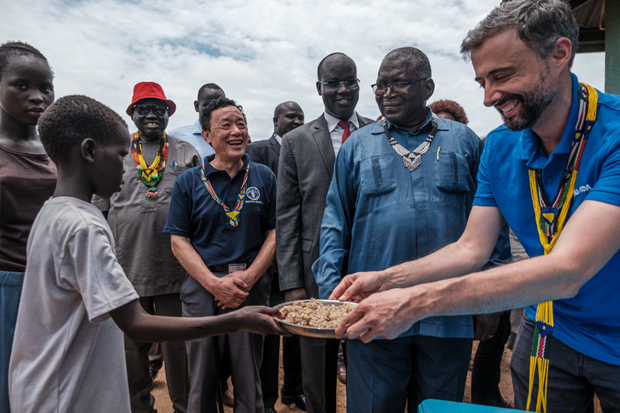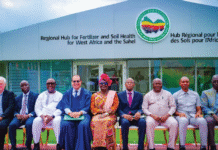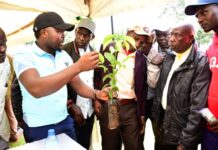The cost of inaction in addressing South Sudan’s complex food, climate, and insecurity crises will be felt in the loss of lives, livelihoods and futures for millions of people across the young nation, the heads of three United Nations agencies, the Food and Agriculture Organization (FAO), the International Fund for Agricultural Development (IFAD) and the World Food Programme (WFP) warned today as they wrapped up a three-day visit to the country.
The Director-General of FAO Qu Dongyu, the President of IFAD Alvaro Lario, and the Executive Director of WFP Cindy McCain visited communities who are grappling with the effects of severe weather events, which, coupled with a lack of infrastructure, are worsening the country’s humanitarian crisis, threatening farms and agro-pastoral livelihoods, and displacing communities.
The visit comes after the joint UN report on the State of Food Security and Nutrition in the World 2023 found that 122 million more people are suffering chronic malnourishment since 2019 and follows just days after world leaders gathered in Rome for the UNFSS+2 summit to take stock of progress made to create more efficient, inclusive, resilient, and sustainable agrifood systems.
“South Sudan has the potential to be the breadbasket of east Africa, but the climate crisis, poor agriculture infrastructure, instability, and economic shocks continue to disrupt agricultural and livestock productivity and food availability. Investments and enabling policies that will improve on longer term food security, resilience and climate adaptation are urgently needed,” said FAO’s Qu.
“South Sudan is a young country, full of potential, but right now families are relying on subsistence agriculture. With only four percent of farmland being cultivated, and 80 percent of its young people living in rural areas, there is enormous opportunity to grow and develop agriculture and the food sector more generally. To do this we need to mobilize massive investments and implement best practices to combat food insecurity and adapt to climate change. This will also greatly improve rural employment. But we need to act now,” said IFAD’s Lario.
“Conflict, climate change, and soaring costs in South Sudan are causing some of the highest levels of hunger in the world. But just handing out food isn’t the solution. We must break the cycle and empower communities to plant the seeds of hope, opportunity, and economic development. With peace and stability, the potential of South Sudan is incredible. However, WFP doesn’t even have the resources needed to feed those who are hungry today – we need the world to step up,” said WFP’s McCain.
The humanitarian emergency in South Sudan is caused by a combination of conflict, climate, and soaring food and fuel prices. The situation is compounded by fighting in Sudan which has led to more than 190,000 people fleeing across the border to South Sudan, further straining already scarce resources. At the same time, 7 out of 10 people in South Sudan are between ages 18 to 35 and youth unemployment rates are at 50 percent, exacerbated by low levels of education, limited skills, and a weak economy.
Collaboration among the three UN agencies and with the Government of South Sudan and other partners helped to stave off famine in recent years and enabled farmers to increase their food production and incomes. However, scaled-up and sustained action is needed to respond to the ongoing hunger crisis, avoid further setbacks, and mitigate future crises.
FAO brings a wealth of technical expertise and best practice in producing food in drought-hit areas, while IFAD invests in small-scale farmers and boosting rural economies and WFP simultaneously provides emergency relief during crises and works with communities to strengthen their resilience to shocks and improve human capital.
Strengthening collaboration
During the visit, the leaders of the UN agencies travelled to Aweil, in Northern Bahr el Ghazal, where they met community members who have been impacted by climate events, including floods and prolonged dry spells, and who are participating in UN projects to strengthen resilience, mitigate the impacts of climate events, and boost food production. They also met with the President of South Sudan, H.E. Salva Kiir Mayardit, to discuss continued collaboration.
A new five-year partnership agreement was also signed to renew inter-agency cooperation which will see the agencies deepen their collaboration and coordination at global, regional and country levels to support the achievement of Sustainable Development Goal 2 – Zero Hunger.
Together, the agencies cover a spectrum of work that spans from humanitarian responses to emergencies and shocks, to resilience and development activities. Under the agreement, the three Rome-based agencies will work on agrifood systems transformation, nutrition, gender equality and women’s empowerment, resilience-building, youth, and climate change.









